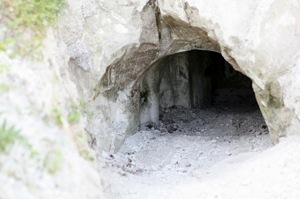 The cave sits just above the treeline on the southern face of a rather unassuming mountain. Standing in the mouth of the cave the Sadhu can see a vast green jungle to the left and the swiftly flowing Ganghes to the right.
The cave sits just above the treeline on the southern face of a rather unassuming mountain. Standing in the mouth of the cave the Sadhu can see a vast green jungle to the left and the swiftly flowing Ganghes to the right.
He sits before his sacred dhuni fire in the predawn morning. His breath coming out in tiny puffs as his mantra echoes through the cave, ‘Om Namah Shivaya, Shivaya Namah Om.’ He is thin, his hair and beard seem to have merged into one tangled mess of dreadlocks and colored ribbons. He sits lightly on a pillow made of cloth wrapped around grass straw.
A few miles up river there is a small village of farmers and weavers. They bring him a bag of food once a month. Mostly it is barley, sometimes rice. Occasionally there is also some root vegetables and sweet fruits. Once there was a bag of black beans with English writing on the paper bag. The cave smelled bad for a few weeks even after the bag of beans was gone.
He collects rain water when he can, and when the rains are scarce he walks a few miles into the jungle to a well that sits hidden within an ancient temple grounds. No one else goes near, they are afraid of the spirits. He talks to the spirits, and they are happy to be acknowledged.
In the morning hours he warms a few handfuls of water for his bath, once that is taken care of he boils a few more handfuls for a meal. Once the water is rolling he grabs a handful of the grains or beans and softly lays them into the bubbling water, offering another incantation to the Supreme Consciousness.
Om Mahadeva, he chants over and over as the water softens the meal. To an observer it would appear that he is in a mindless trance, but within his soul there is singular focus.
Firewood comes from the river. Every morning he leaves the cave in the predawn light and he walks to the river, looking for driftwood. Most mornings he comes back to the cave with a few shinny pieces of wood which get stacks neatly close to the fire so that they dry. After the newest wood has spent a day beside the fire he moves it just so and tomorrow he will stack new wood in that same place. For the fire he uses the wood further back in the cave, it is older and dryer. As he feeds the wood into the dhuni he remembers an ancient mantra and offers it to Agni the god of fire.
His name used to mean something to him, but that might as well have been a past life now. Once he entered the path which led him to becoming a Naga Baba he forgot it, or it was whispered out of his head when his mantra was whispered in to his ear. Either way, he did not see the need for a name now as they were all the same. If someone asked to call him something he made up a new name on the spot. He did so out of love, not to be mischievous, but so that the person had something to associate him with. If they became close enough to know the truth of the matter he would explain that the name was as much his real name as any and they could always call him by it, but they could choose one of their own liking, or simply call him Baba if they wanted. Or nothing. He was comfortable with that, too.
Occasionaly there is a whisper from beyond the veil, and when the time is right he bends and ear to those spirits. They come to pay respects or to listen to his teachings or to offer a teaching to him, depending on who the particular spirit is. Even now, many years after his guru’s passing into the next consciousness, they sit beside each other around the dhuni and discuss the hidden teachings.
“Om Namo Narayan,” a spirit calls from just inside of the flames of his fire. He turns to gaze into the fire and returns the greeting, “Om Namo Narayan.”
“Would you accept company this afternoon?” the spirit asks taking the form of a blue wisp of smoke.
“My consciousness is the whole of the universe. My universe is the complete consciousness. How could you be else or other?” The Naga Baba smiles, closing his eyes and seeing.
Be First to Comment